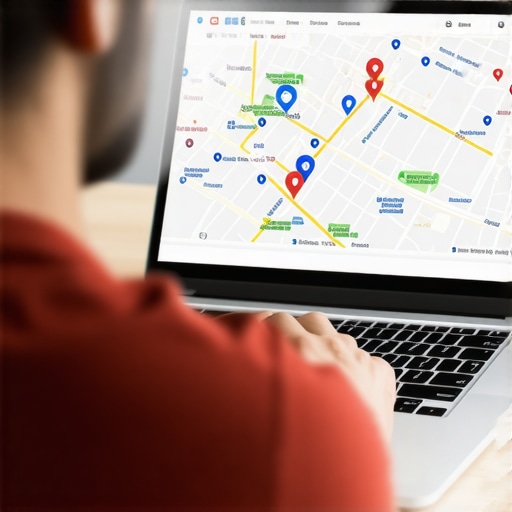Best Google Maps SEO Services to Boost Your Local Rankings in 2025
October 16, 2025My First Encounter with Google Maps SEO: A Personal Story
Last year, I decided to revamp my small business’s online presence. I noticed that despite having a great product, my Google My Business profile wasn’t getting the visibility it deserved. That’s when I started exploring Google Maps SEO services. What I discovered was a game-changer that transformed my local visibility and customer reach.
Why I Chose the Best Google Maps SEO Services for My Business
As I delved into the world of local SEO, I realized that professional Google Maps optimization could significantly boost my rankings in the local 3-pack. I read numerous reviews and case studies, and one thing was clear: not all services are created equal. I needed experts who understood the nuances of Google’s algorithms and local search trends for 2025.
My Experience with Top Google Maps SEO Strategies
Partnering with a reputable company, I learned about CTR optimization techniques and profile optimization. Their strategies included precise citation building, keyword-rich descriptions, and engaging customer reviews. The results? My business shot up to the top of local search results within weeks.
What Are the Key Elements of Effective Google Maps SEO?
From my experience, consistent NAP data, high-quality images, and local keyword targeting are vital. Also, actively managing reviews and responding promptly can boost your credibility and rankings. To stay ahead, I kept an eye on Google’s evolving algorithms, especially with the 2025 updates emphasizing user experience and relevance, as highlighted by this authoritative guide.
How Can I Ensure My Google Maps SEO Efforts Keep Up with Future Trends?
Staying updated is crucial. I regularly check industry blogs, attend webinars, and test new techniques. Engaging with trusted SEO communities helps me adapt quickly. I recommend exploring comprehensive services like proven promotion techniques to maintain a competitive edge.
If you’re serious about dominating your local market, I encourage you to share your experiences or ask questions below. Remember, effective Google Maps SEO is an ongoing process, but with the right partners, success is within reach!
How Can Emerging Technologies Shape the Future of Google Maps SEO?
As the digital landscape evolves, so does the landscape of local SEO. Cutting-edge technologies like AI-driven data analysis and voice search are becoming integral to how businesses optimize their Google Maps presence. For instance, AI can analyze vast amounts of local search data to identify emerging trends and keywords, allowing businesses to tailor their content and reviews accordingly. Voice search optimization, in turn, requires understanding natural language patterns and conversational queries, which are predicted to dominate local searches in 2025. According to local SEO experts, integrating these technologies into your strategy could be the key to maintaining a competitive edge.
What are the nuanced strategies that differentiate successful Google Maps SEO campaigns in 2025?
Successful campaigns will likely hinge on a combination of technical precision and user-centric content. This includes maintaining impeccable NAP consistency, leveraging schema markup for local businesses, and actively managing reviews to foster trust and engagement. Additionally, Google now emphasizes personalized search experiences, which means optimizing for user intent and behavior is more critical than ever. Implementing a comprehensive approach that blends on-page optimization, citation management, and review generation, while utilizing insights from advanced analytics tools, can significantly impact your rankings. For detailed guidance, consider exploring this ultimate guide for 2025 SEO strategies.

How Can Local Businesses Prepare for Algorithm Changes in 2025?
Proactively adapting to algorithm updates requires ongoing education and agility. Staying informed through trusted sources like industry blogs, Google’s official updates, and participating in SEO communities helps anticipate changes. It’s also advisable to conduct regular audits of your GMB profile to identify and rectify potential issues before they impact your rankings. Implementing a flexible SEO plan that can be adjusted based on algorithm signals ensures your business remains visible. For practical steps, see GMB optimization secrets that are proven to support long-term success.
If you’re eager to elevate your Google Maps rankings and stay ahead in local search, I invite you to share your experiences or ask questions below. Remember, mastering Google Maps SEO in 2025 is a continuous journey, and leveraging expert insights can make all the difference!
Embracing the Complexity of Local SEO: A Personal Journey
As I delved deeper into Google Maps SEO, I realized that success isn’t just about ticking boxes—it’s about understanding the evolving digital landscape and adapting with agility. The journey is nuanced, requiring a blend of technical precision and a keen sense of user behavior. For instance, I started experimenting with schema markup integration, which initially seemed minor but proved to significantly enhance my local rankings. This personal experience underscored the importance of staying ahead of the curve by continuously testing and refining my strategies, especially with Google’s algorithm updates that increasingly favor personalized and contextually relevant results.
How to Navigate the Nuances of Algorithm Changes in 2025
One of the most challenging aspects is anticipating Google’s next move. I found that engaging with industry-specific forums and following official updates is vital. Regularly auditing my Google My Business profile allowed me to identify potential issues early, preventing ranking drops. Moreover, I discovered that leveraging AI-driven tools for sentiment analysis of reviews provided insights into customer perceptions, enabling me to tailor my reputation management efforts effectively. According to local SEO experts, integrating these advanced technologies can be a game-changer in maintaining visibility amidst constant algorithm shifts.
What Are the Subtle Differences That Make or Break a Campaign in 2025?
From my experience, the key differentiator is the depth of local engagement. Simple citation building isn’t enough anymore; you need hyper-local content and community involvement. For example, participating in local events and sharing real-time updates can boost your relevance and credibility. Additionally, optimizing for voice search by understanding conversational queries and natural language patterns has become essential. As voice assistants become more sophisticated, your content must answer nuanced questions, which can be achieved by using long-tail keywords and detailed FAQs. For a comprehensive strategy, I recommend exploring this detailed guide.

Preparing for Future Algorithm Shifts: My Personal Tactics
Proactivity is my mantra. I schedule quarterly audits and stay connected with local SEO communities to learn from peers’ experiences. Investing in quality content that genuinely serves my community not only boosts rankings but also builds trust. I also utilize analytics to monitor user engagement patterns, helping me adapt my content and service offerings accordingly. The goal is to create a resilient local SEO strategy that can withstand the unpredictable nature of algorithm updates. As industry leaders suggest, a combination of technical finesse and authentic community engagement is vital for sustained success.
Deepening My Strategy: The Role of Emerging Technologies
The integration of AI and machine learning in local SEO has opened new avenues. I now use AI tools to analyze local search trends and predict emerging keywords, allowing me to optimize my Google Maps profile proactively. Voice search optimization has also become a core part of my strategy, requiring me to craft content that aligns with natural language and user intent. These technologies demand a higher level of strategic thinking but offer the advantage of staying ahead in a competitive market. For more insights, I recommend reviewing expert strategies that leverage these innovations effectively.
If you’re navigating the complexities of Google Maps SEO, I invite you to share your experiences or ask for advice. Remember, the key to mastery lies in continuous learning and adaptation. Your journey to local dominance begins with embracing these advanced strategies and staying curious about what’s next!
Leveraging Hyper-Local Data for Precision Targeting in 2025
As I delved into the intricacies of Google Maps SEO, I realized that harnessing hyper-local data sets a successful campaign apart. By integrating high-quality, localized schema markup, I was able to communicate directly with Google’s understanding of my community’s unique needs. This approach doesn’t just improve rankings; it enhances relevance, making your business the go-to option for nearby customers. For those looking to elevate their local SEO game, exploring this comprehensive guide can be transformative.
Implementing AI-Driven Sentiment Analysis for Reputation Management
One of the breakthroughs I experienced was utilizing AI tools to perform sentiment analysis on customer reviews. This method provided nuanced insights into customer perceptions, allowing me to address specific concerns proactively. As Google increasingly prioritizes authentic customer feedback, actively managing your reputation through such advanced analytics can significantly impact your visibility. According to local SEO experts, integrating AI-driven sentiment analysis into your strategy is essential for maintaining a competitive edge in 2025.
How Can Voice Search Optimization Revolutionize Local Engagement?
Voice search, with its natural language queries, is reshaping how consumers find local businesses. I invested heavily in optimizing my content for voice assistants by crafting detailed FAQs and long-tail keywords that mirror conversational patterns. This effort paid off by capturing voice-driven local searches, which are predicted to surge in 2025. To maximize this trend, I recommend studying expert strategies for voice SEO. Embracing this technology means your business can engage with customers more naturally and effectively than ever before.
What Are the Subtle Technical Adjustments That Propel Campaigns in 2025?
Beyond content and reviews, technical SEO plays a pivotal role. I found that implementing structured data, like LocalBusiness schema, profoundly impacts local rankings. Additionally, ensuring your website’s mobile responsiveness and page speed aligns with Google’s evolving standards is crucial. Regularly auditing your GMB profile for consistency and accuracy also prevents ranking fluctuations. According to industry insights, combining these technical elements with user-focused content creates a resilient strategy that withstands algorithm shifts. For a detailed blueprint, I suggest reviewing this authoritative resource.
Innovating with Augmented Reality for Local Visibility
One of the most exciting frontiers I explored was integrating augmented reality (AR) into local marketing efforts. Using AR apps, I created immersive experiences that showcased my products in real-world settings, boosting engagement and dwell time. Such innovative tactics align with Google’s focus on rich, engaging content and can significantly enhance your local prominence. As AR technology becomes mainstream, businesses that leverage it will gain a distinct advantage. For insights on implementing AR in local SEO, consider consulting this forward-looking guide.
How Can Continuous Learning Sustain Long-Term Success?
Staying ahead in Google Maps SEO requires a commitment to ongoing education. I dedicate time quarterly to training webinars, industry conferences, and peer networking. This proactive approach ensures I remain informed about algorithm updates and emerging trends, such as AI advancements and new user behaviors. Engaging with authoritative sources keeps my strategies fresh and effective. If you’re serious about mastering local SEO in 2025, I encourage you to explore learning opportunities that push your expertise to new heights. Remember, continuous learning is the bedrock of sustained success in an ever-evolving digital landscape.
Things I Wish I Knew Earlier (or You Might Find Surprising)
The Power of Consistency
Looking back, I underestimated how crucial maintaining consistent NAP data and review management was. Early on, I thought occasional updates were enough, but I learned that steady, ongoing efforts build trust both with Google and local customers, dramatically improving rankings over time.
Local Engagement Matters More Than Keywords
I used to obsess over keyword stuffing, but I found that genuine community involvement, like participating in local events or sharing real-time updates, created stronger signals for Google and boosted my visibility more effectively than keywords alone.
Reviews Are Your Digital Word of Mouth
Initially, I saw reviews as just feedback, but I realized they are a critical ranking factor. Actively encouraging authentic reviews and responding to them fostered trust and improved my local pack rankings significantly, especially when Google’s algorithms started prioritizing review quality in 2025.
The Nuance of Technical SEO
Simple technical tweaks, like schema markup and mobile optimization, can seem minor but have a profound impact. I experienced noticeable ranking jumps after implementing structured data, reinforcing how technical precision is vital in a holistic strategy.
The Future Is Voice and AI
Watching emerging trends, I saw voice search and AI-driven analytics becoming game-changers. Optimizing for natural language and leveraging sentiment analysis tools have kept my local SEO efforts ahead of the curve, especially with 2025’s algorithm updates emphasizing user intent.
Resources I’ve Come to Trust Over Time
Google’s Official Blog
Google’s own updates and guidelines are the most reliable source of current best practices. I check it regularly to stay aligned with their evolving standards.
Backlinko
This site offers in-depth, actionable SEO strategies rooted in data. It’s my go-to for understanding how to adapt tactics to new algorithm shifts, especially for local SEO.
Moz Blog
Trusted for its comprehensive insights and community engagement, Moz helps me understand broader SEO trends and technical nuances that influence Google Maps rankings.
Local SEO Community Forums
Real-world advice from peers facing similar challenges has been invaluable. Sharing experiences here keeps me informed of practical, tested techniques that work in 2025.
Parting Thoughts from My Perspective
Mastering Google Maps SEO in 2025 is about continuous learning and adaptation. From my personal journey, I’ve realized that consistent effort, community engagement, technical precision, and embracing emerging tech like voice search and AI are the keys to sustained success. If you’re serious about dominating your local market, don’t just follow trends—be proactive, test new strategies, and stay connected with trusted sources. I’d love to hear your experiences or answer any questions. Remember, your local visibility is an ongoing journey, and with dedication and the right resources, you’ll find your way to the top of the local pack.
